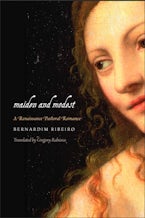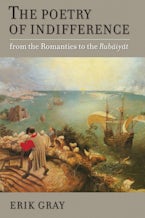- Home
- Adamastor Series
- Maiden and Modest

Maiden and Modest
A Renaissance Pastoral Romance
Translated by Gregory Rabassa
Other primary creator Earl E. Fitz
Published by: Tagus Press
Series: Adamastor Series
122 Pages, 6.25 x 9.25 x 0.60 in
Other Retailers:
Modern readers will be surprised by Ribeiro's complex treatment of love and longing in Maiden and Modest (1554), because his narrative of suffering and unhappy love is told from the perspective of female protagonists. Indeed, a strikingly feminist note infuses the entire narrative, which also contains both autobiographical aspects and traces of the Cabala and Zohar. A self-conscious narrative that explores issues of gender, identity, and sexuality, Maiden and Modest makes a significant contribution to the development of the European novel. This is an essential book for readers of sixteenth-century literature and scholars of European fiction, sixteenth-century European studies, Renaissance studies, comparative literature, Jewish studies, women's studies, and feminist fiction.
BERNARDIM RIBEIRO (1482?–1552?), likely a Jewish "New Christian," was a prominent Portuguese Renaissance writer and courtier. GREGORY RABASSA is the preeminent translator from the Spanish and Portuguese.
"In Maiden and Modest the loves and sufferings of knights and ladies come alive, in a landscape of enchanted beauty, which includes uncanny visitations from the spirit world. Ribeiro's prose reveals the sensibilities of a poet, but with the psychological insight of a novelist, and Maiden and Modest is part of the substratum from which the modern novel would emerge. In his narratives Ribeiro was as conscious of the ambiguities of gender relationships as any of the writers who came later. He was also a master storyteller, and his tightly woven plots extract the maximum potential from the searing tragedies that unfold."—T. F. Earle, King John II Professor of Portuguese Studies, University of Oxford
"Bernardim Ribeiro's psychological novel, a sequence of embedded tales told by a young female narrator, carries chivalric tales into a modern tradition of inner questioning and doubt in the face of the uncontrollable forces and strategies of desire. Thanks to Rabassa's brilliant translation, Maiden and Modest can now take its place alongside Renaissance classic texts."—K. David Jackson, professor of Portuguese, Yale University











